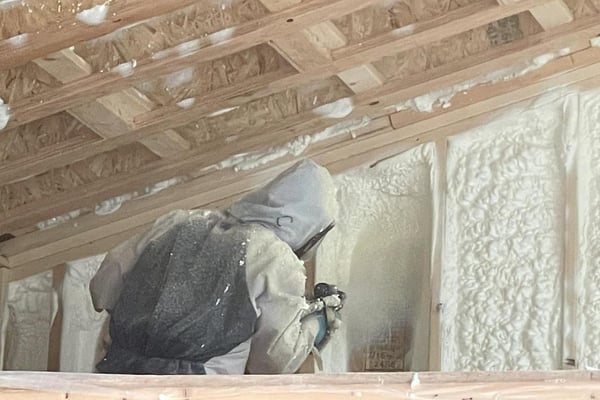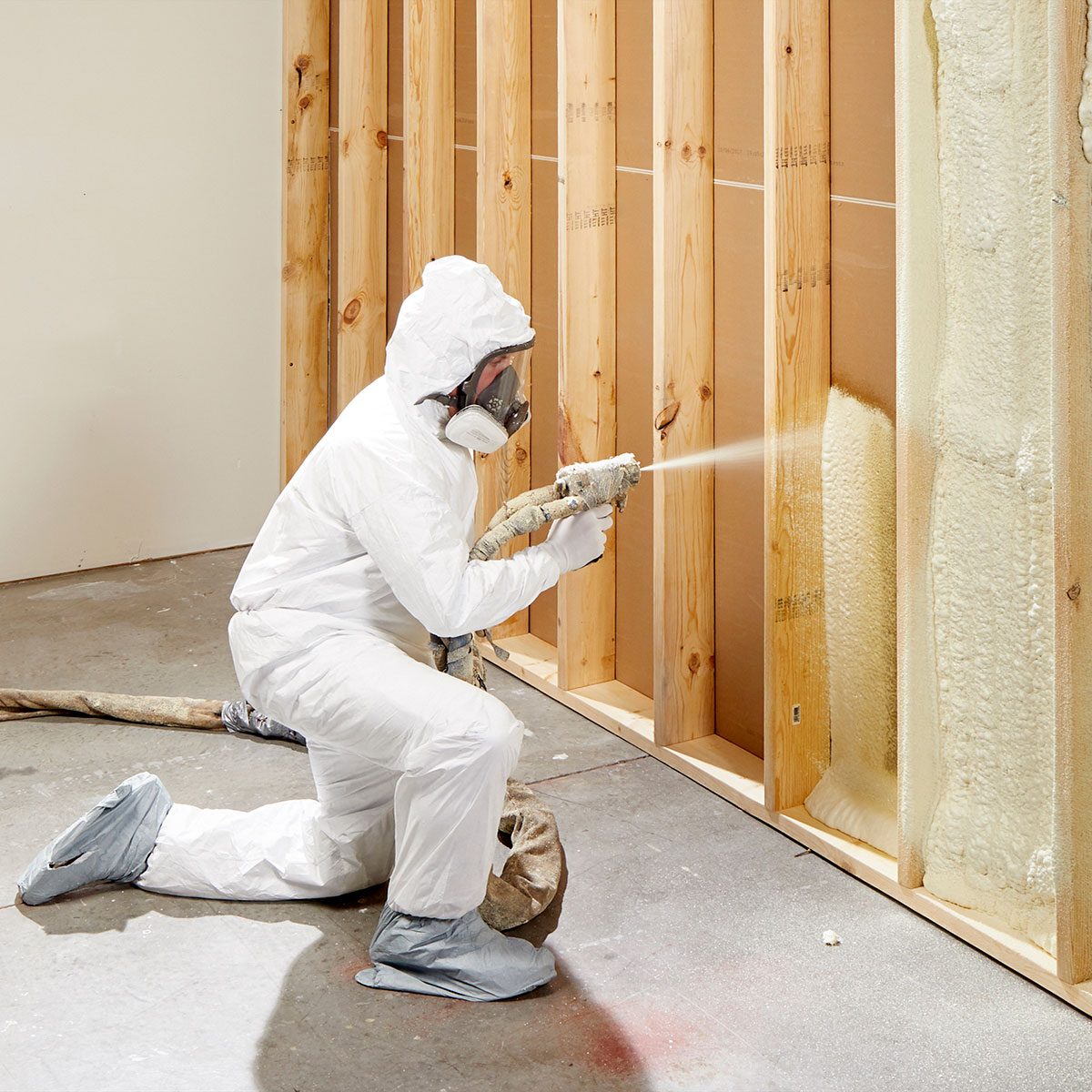Contrasting Spray Foam to Typical Insulation: Which Is Much better?
Contrasting Spray Foam to Typical Insulation: Which Is Much better?
Blog Article
Exactly How Spray Foam Can Enhance Energy Performance in Any Type Of Structure
Spray foam insulation has become a pivotal option for improving power performance across different structure kinds. By producing an impermeable seal that reduces air leak, it effectively controls interior climates while dramatically reducing heating & cooling costs. In addition, its outstanding R-value and moisture-resistant properties contribute to long-lasting energy financial savings and enhanced structure long life. As residential or commercial property owners progressively seek lasting services, the implications of spray foam insulation prolong beyond mere utility savings. The full scope of its benefits, however, warrants a closer examination of how it can transform energy management techniques in both industrial and property setups.
Understanding Spray Foam Insulation
Spray foam insulation is significantly recognized for its premium thermal efficiency and convenience in different applications. Composed primarily of polyurethane, this insulation material is used as a liquid that increases upon get in touch with, filling up gaps and developing a smooth barrier. This special building enables spray foam to satisfy irregular surface areas, making it a suitable option for both industrial and household frameworks.

Application of spray foam insulation is normally carried out by experienced specialists making use of specialized tools, making sure optimum performance and security - Spray Foam. The treating procedure is quick, permitting quick setup and very little disturbance. Therefore, spray foam insulation is progressively being used in brand-new construction and retrofitting projects due to its capability to improve architectural honesty while improving overall energy efficiency in buildings
Benefits of Energy Effectiveness
Energy efficiency plays a critical function in minimizing operational costs and minimizing environmental influence throughout different industries. By optimizing power usage, home owners and services can accomplish significant financial savings on energy costs, which straight improves economic performance. Efficient energy consumption suggests less dependence on nonrenewable fuel sources, thus contributing to a decrease in greenhouse gas exhausts and promoting an extra sustainable environment.
Additionally, energy-efficient buildings frequently experience increased home values. As power costs climb and sustainability comes to be a priority for customers, properties with improved energy performance functions are more appealing on the market. This pattern urges investment in energy-saving innovations, which can additionally drive innovation and financial growth.
In enhancement to financial and environmental benefits, power efficiency can likewise boost the general convenience and health of interior rooms. Proper insulation and effective heating and cooling systems aid maintain constant temperature levels, decreasing drafts and moisture levels, which consequently can lead to much better interior air quality.
Inevitably, the benefits of energy performance extend beyond instant financial savings, fostering a durable economic situation, promoting environmental stewardship, and improving the lifestyle for occupants in any type of structure.
Just How Spray Foam Functions
Generally applied as a liquid, spray foam broadens quickly upon call with surface areas, forming a solid barrier that properly seals cracks and gaps. This distinct residential or commercial property results from its chemical make-up, primarily including isocyanates and polyols, which react when mixed to create a foam that fills up voids and adheres to numerous products, consisting of steel, wood, and concrete.
When applied, the foam broadens to a number anonymous of times its original volume, making certain a tight seal that avoids air leakage. This process significantly reduces thermal linking, which happens when warmth transfers via products, causing energy loss. The foam's high R-value, a step of thermal resistance, contributes to boosted insulation by decreasing warmth transfer between the exterior and interior atmospheres.
Additionally, spray foam is immune to moisture and insects, better improving its effectiveness in maintaining power effectiveness. Its application can be tailored to various areas, consisting of attic rooms, walls, and crawl rooms, enhancing insulation across a structure. Spray Foam. Generally, the ingenious layout and application technique of spray foam make it an effective remedy for enhancing power effectiveness in any kind of structure, leading to minimized energy expenses and a more lasting built setting

Applications in Numerous Buildings
Numerous applications of spray foam insulation can be discovered throughout various building kinds, boosting energy effectiveness and convenience. In domestic homes, spray foam is commonly utilized in wall surfaces and attics to produce a smooth barrier against air leakages, substantially lowering home heating and cooling down demands. This application is especially advantageous in older homes, where typical insulation may be insufficient.
In commercial structures, spray foam insulation is put on roofing system systems and outside wall surfaces, which aids to improve thermal efficiency and protect against moisture intrusion. Its lightweight nature makes it a suitable selection for retrofitting existing frameworks without adding considerable weight. Furthermore, spray foam can be utilized in commercial setups to protect pipes and storage space containers, keeping temperature level control for delicate products.
Institutional structures, such as hospitals and schools, take advantage of spray foam insulation by guaranteeing a constant indoor climate that sustains owner convenience and wellness. The adaptability of spray foam enables it to adapt to various building sizes and shapes, making it a favored choice for architects and home builders seeking effective insulation remedies. On the whole, spray foam insulation functions as a critical part in accomplishing energy-efficient buildings across all sectors.
Long-Term Price Cost Savings
Spray foam insulation provides significant lasting expense savings for structure owners and occupants by reducing power consumption and decreasing energy bills. By providing a premium air seal, spray foam visit homepage lessens the infiltration of outdoors air, thus enhancing the thermal efficiency of a building. This causes much more reliable heating and cooling down processes, which can lead to significant reductions in power costs with time.
In addition to prompt cost savings on energy expenses, the resilience and long life of spray foam insulation contribute to its economic benefits. Unlike typical insulation materials, which might sag, resolve, or weaken, spray foam keeps its performance for decades, lowering the need for regular substitutes or repair work. This long life translates to lower maintenance costs and much less interruption for residents.
Additionally, buildings equipped with spray foam insulation usually enjoy a boost in residential property worth, making them extra attractive to possible buyers or renters. As power performance becomes increasingly prioritized, residential or commercial properties with efficient insulation solutions stick out in the market. Ultimately, the integration of spray foam insulation not only enhances comfort however likewise stands for a critical financial investment that produces substantial economic advantages over the long-term.
Conclusion
In conclusion, spray foam insulation works as a vital component in enhancing energy efficiency across varied structure kinds. Its capability to produce a seamless barrier against air leakage, combined with moisture-resistant residential properties and high r-values, dramatically lowers power consumption and associated other prices. The execution of spray foam not only adds to consistent interior temperatures but additionally boosts home value, emphasizing its function as a prudent investment for both property and industrial residential or commercial properties.
Spray foam insulation has actually emerged as a critical solution for boosting energy performance across various structure types. Spray Foam. As a result, spray foam insulation is significantly being utilized in brand-new building and retrofitting projects due to its capacity to improve structural honesty while improving total energy performance in buildings
On the whole, the ingenious design and application technique of spray foam make it an efficient service for enhancing power performance in any type of structure, leading to minimized power expenses and an extra lasting developed setting.
Numerous applications of spray foam insulation can be discovered throughout numerous building types, boosting energy effectiveness and convenience.In conclusion, spray foam insulation serves as an essential element in boosting energy effectiveness throughout varied building types.
Report this page